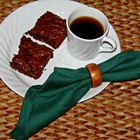airrazab/iStock/GettyImages
Keurig — their name is from the Dutch word for "excellence" — came up with a great idea for coffee lovers everywhere: the single-serve cup. Their patented process allows you to choose a different gourmet flavor coffee for every cup without having the bother of making a whole pot of coffee each time.
Keurig individual K-Cups come in a variety of brands, brews and flavors, including more than 200 types of regular coffee, latte, cappuccino, hot chocolate and iced beverages.
Calories
Most of the calories in any coffee, including Keurig coffee, come from the additives you use. For example, one individual K-Cup of Folgers Coffee taken black in a six ounce cup has only two calories.
Add one teaspoon of sugar and one tablespoon of half-and-half, and a 10 ounce cup of Keurig regular coffee has 36 calories. One K-Cup of Cafe Ole's Caramel Flavored Cappuccino has 80 calories. If you eat a typical diet of 2,000 calories per day, a cup of Keurig coffee provides less than one percent to eight percent of your daily calories.
Fat
Again, all the fat in your cup of coffee comes from the additives. One K-Cup of Folgers Coffee contains no fat, but with one tablespoon of half-and-half and one teaspoon of sugar, it has two grams of total fat with one gram of saturated fat.
An K-Cup of Cafe Ole's Caramel Flavored Cappuccino contains 4.5 grams total fat, including four grams of saturated fat. MayoClinic.com advises that you limit your intake of saturated fats to less than 10 percent of your daily calories to reduce your risk of high cholesterol and heart disease.
Carbohydrates and Sugar
Although there are no carbohydrates in a K-Cup of Folgers Coffee taken black, it contains one gram of carbohydrate when you add one teaspoon of sugar and one tablespoon of half-and-half.
Sweetened, flavored coffees contain the most sugar; one K-Cup of Cafe Ole's Caramel Flavored Cappuccino contains nine grams of carbohydrates with four grams of sugar. To avoid tooth decay, weight gain and heart disease, the American Heart Association recommends women get no more than 100 calories per day from added sugar and men get no more than 150 calories per day.
Related Articles

Homemade Coffee Scrub

Caffeine in Chocolate Versus Coffee

Fat-Free and Sugar-Free Jell-O Pudding ...

How to Make Coffee for a Crowd

Protein in Coffee Beans

Foods Containing Theobromine

How to Make Sugar Free French Vanilla ...

Description & Characteristics of ...

How to Add Chicory to Coffee

Nutritional Information for Fontana ...

How to Descale a Gaggia

The Paleo Diet and Coffee

Cappuccino Nutrition Information

Calories in Tofu Cream Cheese

How to Brew Whole Bean Coffee

Wendy's Frosty Nutrition Information

Calories in Peppermint Extract

Number of Calories in Dark ...

Chai Tea Frappuccino Calories

Which Country Produces the Most ...
References
- MyFitnessPal: Keurig Coffee People Donut Shop X-Bold Coffee Nutrition Facts
- MyFitnessPal: Keurig Coffee With 1 Tbsp. Half-and-Half and 1 Tsp. Sugar Nutrition Facts
- MyFitnessPal: Keurig Green Mountain Coffee French Vanilla Cappuccino Nutrition Facts
- American Heart Association: Sugars and Carbohydrates
Writer Bio
Kathryn Meininger began writing and publishing poetry in 1967. She was co-founder and editor of the professional magazine "Footsteps" and began writing articles online in 2010. She earned a Doctor of Podiatric Medicine from Temple University School of Podiatric Medicine and a Bachelor of Arts in biology from William Paterson University.